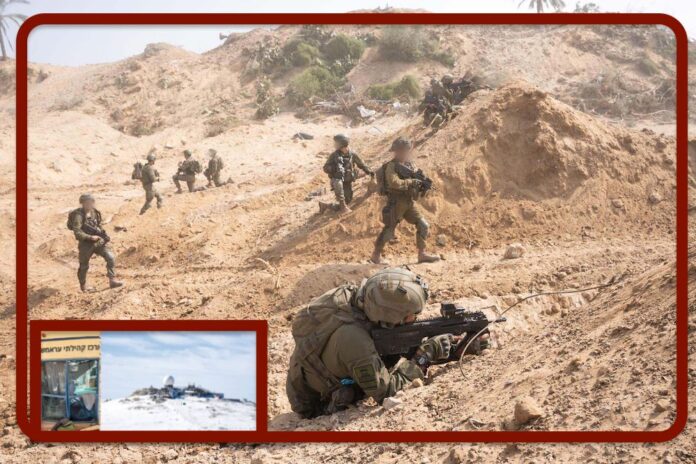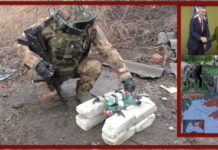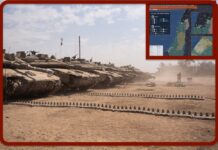
After the Iranian attack on Israel on April 13, the dialogue for the release of prisoners and for a ceasefire in Gaza came to a halt. The Prime Minister of Qatar, a country at the forefront of mediators, Mohammed bin Abdulrahman bin Jassim Al Thani, said: “The talks for the ceasefire in Gaza and the release of detainees are going through a delicate phase. We condemn Israel’s policy of collective punishment in the Gaza Strip and the escalation in the West Bank.”
On April 17 there was a meeting between Israeli President Isaac Herzog and the Foreign Ministers of Germany, Annalena Baerbock and Great Britain, David Cameron. Israeli Foreign Minister Israel Katz together with David Cameron and Annalena Baerbock in a joint statement said: “We now have the opportunity to change the region: call the Revolutionary Guards by their real name – a terrorist organization and impose sanctions on Iranian missile project”. The British Foreign Secretary said: “Israel has told us that it will respond by attacking Iranian territory and we support that.”
The Jordanian Foreign Minister addressed Israel and Iran and said that his country no longer wants to be a battlefield between them.
According to the American assessment provided by Axios, Iran will respond to any major and public Israeli attack on its territory with new missile and UAV attacks. It will be difficult for Israel to repeat its previous success if Iran launches hundreds of missiles and UAVs, and Israel knows it.
The United States will restrict the freedom of movement of Iranian Foreign Minister Hossein Amir-Abdollahian, who arrives in New York this week to address the United Nations General Assembly, CNN reports. According to the report, the movements of the Minister and his entourage will be limited to only a few streets near the United Nations headquarters in Manhattan and the Iranian mission to the United Nations, as well as access to and from JFK airport.
According to CBS, the United States estimates that Israel will carry out a limited attack on Iranian territory, but also emphasizes that Israel does not share information on this issue with the United States, and therefore the plans are unclear. It was also reported that the United States feared that Israel would not inform them in advance of such an attack.
A satellite image of the Ramon air base in Israel, which was attacked by Iranian ballistic missiles on April 14, has been published online. Two hangars for repairing ground equipment, a maintenance station for transport aircraft, the officers’ guesthouse and, possibly, a watchtower were damaged.
According to NBC, a possible Israeli response will come from outside Iran. The channel’s sources expect Israel to target Tehran-backed regional groups, particularly in Syria.
A senior U.S. administration official told ABC News that the White House is relying too much on the mistaken belief that Iranian Supreme Leader Khamenei will be careful never to launch a direct attack on Israel. As for Iran, study and reassessment are now needed.
Alo Pinkas, an Israeli diplomat, said that Israel is unlikely to respond with a direct attack on Iran. Any Israeli attack on the nuclear facilities or military installations of the Islamic Republic will lead to a certain level of tension.
“Israeli public opinion does not want to open a new front because the Israeli army is still fighting in the Gaza Strip. The people (settlers) are still very upset and shocked by what happened in October, so I don’t think there is any general desire to escalate and open a full-fledged direct conflict with Iran.” He commented the diplomat.
The Israeli newspaper Maariv reported quoting a military expert: “There is no truth in the words of the Israeli army spokesman regarding the interception rate of Iranian missiles which has reached 99%. We saw the missiles fall on the bases of Nafatim and Ramon. It is true that there was an interception, but the percentage is greatly exaggerated and the objective is to guarantee safety for the population.”
Former Iranian President Mohammad Khatami made a series of statements: “Iran’s response to Israel’s crime was courageous, logical and legal. In Iranian drone and missile operations against Israel, all aspects of the issue have been fully taken into account within the framework of clear rules and international legal relations. The Iranian operation sent a clear signal that Israel does not imagine that if he commits any crime or harm or acts in violation of some international rules and international institutions do not fulfill their legal obligations towards him, then this will not be an answer. Maintaining security and stability in the region and stopping escalation are Iran’s priorities.” And again: “I hope that peace comes to a region that desperately needs security and development.”
The Swiss ambassador to Tehran was summoned not to the Iranian Foreign Ministry, but to the IRGC headquarters to warn him of the consequences of a retaliatory attack by Israel and the United States after Iran’s attack on Israel on April 13. Tehran wants peace and security and will never take provocative measures, Iranian Ambassador to Moscow Kazem Jalali told TASS.
Iranian security chief Abolfazl Amoui said Tehran was “ready to use weapons it has never used before” if Israel responded to Iran’s April 14 attack. The commander-in-chief of the Iranian Navy said that Iranian warships will accompany Iranian commercial ships sailing in the Red Sea. The Jamaran destroyer operates in the Gulf of Aden and escorts commercial ships in the Suez Canal
The Commander of the Iranian Air Force: We are ready to hit targets, especially with the help of the Su-24. As far as the use of other aircraft is concerned, we are 100% ready. If the enemy makes a strategic mistake, he will receive a blow that he cannot compensate for.
On April 17, the commander in chief of the Iranian army, General Abdul Rahim Mousavi, also spoke in a statement to Al-Mayadeen: “The Iranian armed forces are ready to respond decisively and with decisive force to any attack that threatens interests of the Islamic Republic. The wise people on the other side are trying to prevent the Israeli entity from making a mistake again, but for us the enemy is the enemy.”
Iranian Army Navy Commander Shahram Irani, in a statement to Al-Mayadeen: “For 45 years we have received threats from enemies, but we have not backed down, nor submitted nor stopped.”
The IDF showed a video of an Iranian ballistic missile falling into the Dead Sea and being recovered almost intact and will now be studied by military experts. The Israel Defense Forces (IDF) have decided how to respond to Iran’s attack, but have not yet decided on a date, writes the Jerusalem Post, citing sources. According to the publication, response options range from hitting Iranian nuclear facilities to attacking drones or ballistic missiles. Sanctions against the Iranian Islamic Revolutionary Guard Corps (IRGC) and a cyber attack are also being considered.
Hezbollah also showed a video of the April 13 attack of the Iron Dome missile defense system using 13 stray munitions. And again Hezbollah claimed responsibility for the attack by showing a video of the attacks in Galilee on 17 April. Hezbollah allegedly attacked the Iron Dome defense system with two squadrons of suicide drones, destroying it and killing and wounding its crew.
And now a look at the front line updated at 4.30pm on April 17.
Third consecutive day in which Hezbollah fires against northern Israel. Sirens sounded at the Beranit site after a missile was fired from southern Lebanon. After the sirens sounded in Alkush, 4 missiles were tracked from southern Lebanon. A guided missile exploded near the Israeli army base in Jabal al-Jarmaq in the Galilee.
The Islamic Resistance has targeted a new deployment of Israeli soldiers south of the Pranit Barracks with rocket-propelled weapons and artillery shells. Explosion heard in Meron fire directed from Lebanon.
A site in Arab al-Aramshe in the Western Galilee was hit with a guided missile. An Israeli army helicopter was damaged while rescuing the wounded in Aramsha on the border with Lebanon. There were 14 injured, 4 of them seriously. The Islamic Resistance claimed responsibility for the attack, speaking of a “combined attack with guided missiles and assault drones against the headquarters of the new military reconnaissance company in Arab al-Aramshe. Israel denies there was drone penetration.
In response, Israel launched an airstrike with missiles against the city of Aita al-Shaab.
Northern Gaza is turning into a “sanitary abomination”. Thousands of tons of waste and rubble threaten the lives of residents. Clashes and riots continue in northern Gaza. The spokesperson of the Israeli occupation army: Yesterday a fighter from the “Sheldag” unit was seriously wounded in a battle in the northern Gaza Strip and the fighter was transferred to hospital to receive treatment.
Israeli artillery shells target Al-Mufti Land, New Camp, Al-Mughraqa and Al-Zahraa, north of Al-Nuseirat Camp in the center of the Gaza Strip.
13 deaths were reported after Israel bombed a group of Palestinians near the Sheikh Radwan Bridge in Gaza.
Israeli forces storm Shuafat camp, north-east of Jerusalem. The Al-Quds Brigades – Tubas Battalion claimed pre-prepared bomb attack with a military bulldozer and clashed with Israeli forces near Al-Quds Open University, Al-Ahmadin roundabout and several axes of the city.
Antonio Albanese e Graziella Giangiulio
















